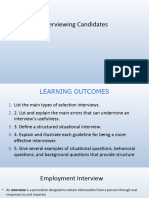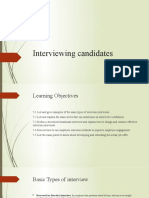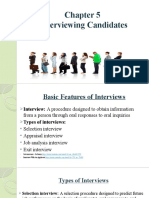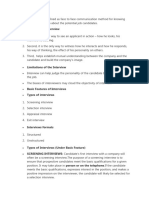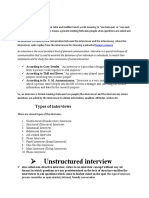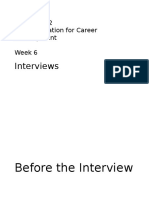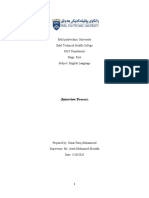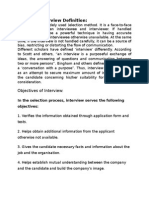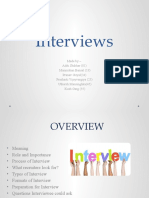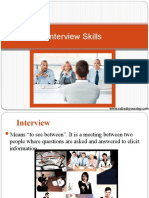1
Uploaded by
kevin841
Uploaded by
kevin84Topic Interviewing
LEARNING OUTCOMES
By the end of this topic, you should be able to: 1. 2. 3. 4. Describe several basic types of interviews; Identify the key factors for successful interviews; Identify the types of interviews form and checklist; and Analyse the interviewing successfullness and failures.
INTRODUCTION
Welcome to Topic 4! In this topic, you will learn about interview in greater detail. Do you know that interviews are particularly useful for getting the story behind a participant's experiences as well as attaining in-depth information about a topic? Interviews may also function as a follow-up to certain respondents questionnaires e.g., to further investigate their responses. Interview plays a different role for different parties. Candidates perceive interview as a method of getting a job. In order to be selected, candidates must be able to convince potential employers that they are a good match. On the other hand, an employer conducts interview as a way of finding the right person for the vacancy available. By interviewing a candidate, an employer will have a clear idea of what skills, experience and personality are required by the position offered, refer to Figure 4.1.
TOPIC 4 INTERVIEWING
93
Figure 4.1: Employer will have a clear idea of a candidates skills, experiences and personality throught interview session
4.1
TYPES OF INTERVIEWS
There are 17 different types of interviews that a HR manager can choose to conduct. Let us now study them one by one in greater detail. (a) Screening Interview This is a preliminary interview which can be done either in person or by phone. Through this interview, the company representative determines whether the interviewee has the basic qualifications to justify for the subsequent interview. (b) Structured/Patterned Interview This is a very straightforward interview. All candidates will be asked a standard set of questions that are designed to pinpoint skills essential to the position offered. Through this interview, the interviewer will be able to compare candidates experience and skills with those that are required by the job offered. Results among candidates are then compared. This interview is very common and it is also fairly easy to conduct. Unstructured Interview The interviewer is provided with a written description of the ideal candidate. However, there is no instruction on what specific areas to cover. Multiple Interviews Multiple interviews are commonly used with professional jobs. A candidate will be interviewed by a series of interviews individually by various representatives of the organisation. The initial interview is usually conducted to gather basic information on candidates skills and abilities. In subsequent interviews, candidates performance on the job in relation to the
(c)
(d)
94
TOPIC 4
INTERVIEWING
company's goals and objectives is assessed. After completion, the interviewers compare information gathered and make collective decision. In some cases, unsuitable candidates are screened out at each succeeding level. (e) Stress Interview In this interview, candidates are intentionally put under pressure in order to have their responses evaluated. Candidates may be asked questions that would make them uncomfortable or they may be interrupted when they are speaking. Targeted Interview This interview is similar to the structured interview but its area of coverage is much more limited. Key qualifications for success on the job are identified and relevant questions are prepared in advance. Situational Interview Situations are set up which simulate common problems candidate may encounter on the job. Candidates responses to these situations are measured against pre-determined standards. This approach is often used as a part of traditional interview rather than as an entire interview format. Group Interview The candidate is interviewed by two or more company representatives simultaneously. Sometimes, one of the interviewers would be inclined to ask stress questions to see how candidate would respond under pressure. The interviewers may also interview a group of candidates at the same time. Video Interview Video interview comprises of transfer of audio and video between two remote sites. It is a convenient communication method and an alternative to the more costly face-to-face meetings. The involved parties only need to have access to the Internet and proper tools i.e. microphone, camera and compatible software and with that an interview can be conducted. Video interview is becoming a popular method of interview due to its efficiency and low costs. Serial Interviews Candidates are passed from one interviewer to another throughout the course of a day, or sometimes may take up a full weekend or even several days. After the final interview has taken place, the interviewers will discuss and make a collective decision. To succeed in this type of interview, a
(f)
(g)
(h)
(i)
(j)
TOPIC 4 INTERVIEWING
95
candidate must project the proper first impression and should always be ready and energised for each interview. (k) Audition Interview Sometimes companies wish to know how a potential candidate would perform real-time before selection is made and this is achieved through audition interview. Candidates are required to perform job task in a simulated situation and this allows them to demonstrate their abilities in interactive ways that are familiar and at the same time provide them with a simplified sense of what the applied-for position requires. This type of interview works well for job openings for computer programmers, trainers, welders and mechanics. Stress Interview A stress interview is generally intended to put candidates under stress and have their reactions stressed. Candidates may be held in the waiting room, face long silences or cold stares, or be challenged in terms of their beliefs or judgements. Interviewer may ask candidates to perform an impossible task or be convinced to do tasks irrelevant to job requirement. They may also be faced with insults, rudeness and miscommunication. All these are designed to see if they have the right criterion to deal with company culture, clients or any other possible stress.
(l)
(m) Informal Interview Job seekers secure informational meetings to seek the advice from someone in their current or desired field and to gain further references. Employers who belong to the list of available talents are often open to these types of interviews even when there is no vacancy. (n) Directive or Structured Style In a directive or structured interview, the interviewer has a clear agenda and follows it to the utmost detail. This format is rigid and is used to ensure parity between interviews. Each candidate is asked the same series of questions and results are then compared. Tag Team Interview This interview is often practiced by companies that rely heavily on team cooperation. Candidates are placed in a room with several other people and then the interview will take place. Through this method, employers could gain insights of various people and determine if the candidate's skills meet the needs of the company and whether or not the candidate can get along with other workers.
(o)
96
TOPIC 4
INTERVIEWING
(p)
Meandering Style Interview The meandering style interview is often used by inexperienced interviewers in which interviewer relies on the candidate to lead the discussion. Broad questions such as, tell me about yourself, may be thrown to the candidates and candidates can often lead or manipulate this type of interview according to what serves them best. This could be an advantage as long as candidates show respect and let the interviewer be in control. The behavioural interview The behavioural interview is a structured interview where applicants are asked to relate actual incidents from their past relevant to the target job. In a behavioural interview, a situation is described and interviewees are asked how they have behaved in the past in such a situation. (i) Questions in a Behavioural Interview Behavioural interviews can produce a lot of tension as interviewees need to react to situations in the past as the interviewer assumes that past behaviour is the best predictor of future behaviour. You can see some of the example questions in a behavioural interview are as follows:
(q)
Give an example of an occasion when you used logic to solve a problem. Give an example of a goal you reached and tell me how you achieved it. Describe a decision you made that was unpopular and how you handled implementing it. Have you gone above and beyond the call of duty? If so, how? What do you do when your schedule is interrupted? Give an example of how you handled it. Have you had to convince a team to work on a project they were not thrilled about? How did you do it? Have you handled a difficult situation with a co-worker? How? Tell me about how you worked effectively under pressure.
Source: http://jobsearch.about.com/cs/interviews/a/behavioral.htm
TOPIC 4 INTERVIEWING
97
(ii)
Problems in Conducting Interviews There are several common interviewing mistakes that undermine an interviews usefulness that can threaten the success of employment interviews. The tendency of the interviewer to become either favourably or unfavourably impressed with the job applicant for the wrong reason. Closely related is the problem of the halo effect that occurs when the interviewer allows a single prominent characteristic to dominate judgement of all other traits. For instance, it is often easy to overlook other characteristics when a person has a pleasant personality. However, merely having a pleasant personality does not necessarily guarantee that the person will be a good employer. Central tendency in the interview can occur when the interviewer virtually rates all candidates as average, as he or she fail to differentiate between strong and weak candidates. Some of the interviewers make premature judgements about candidates in the first few minutes of the interview. When this occurs, a great deal of potentially valuable information will not be considered. Some of the interviewers tend to give inappropriate or unintended non-verbal communication such as fingers moving up and down, facial expressions, playing with the fingers etc. that could be interpreted wrongly by the interviewees. Interviewer domination in the interview session by asking and answering his own questions without giving much opportunity to the interviewees to speak for himself or herself. In successful interviews, relevant information must flow both ways. Therefore, interviews must learn to be good listeners as well as suppliers of information.
98
TOPIC 4
INTERVIEWING
ACTIVITY 4.1
Form a small group with several of your class members and develop a Activity 1.1 mock interview session. Here are some possible questions to explore when conducting the session: Be prepared to present your best practices to other members of your class.
Do you prefer to work in a small, medium or large organisation? Why do you want this job? What qualities do you think this job requires? Why do you want to work for this organisation? What have you got to contribute? What can we offer you that your previous organisation cannot offer? How long have you been looking for a new job? What do you know about this organisation? What interests you about this organisation? What are you looking for in a new job? What do you not like about the job?
ACTIVITY 4.2
Cumi and Ciki Cleaning Centres The Better Interview Like virtually all the other personnel management related activities at Cumi and Ciki Cleaning Centres, the company currently has no organised approach to interviewing job candidates. Store managers, who do almost all the hiring, have a few of their own favourite questions that they ask. However, in the absence of any guidance from top management, they all admit their interview performance leaves something to be desired. Similarly, Mr. Jamil Mohd himself is admittedly most comfortable dealing with what he calls the "nuts and bolts" machinery aspect of his business and has never felt particularly comfortable having to interview management or other job interviewees. Mr. Jamil is sure that lack of formal interviewing practices, procedures and training account for some of the employee turnover and theft problems. Therefore, he wants to do something to improve his company's scoring average in this important area.
TOPIC 4 INTERVIEWING
99
Questions
1.
In general, what can Mr. Jamil do to improve his employee interviewing practices? Should he focus on methods of interviews that suit the needs and requirements of his company? Or should he develop an interview list of questions for management and nonmanagement jobs, and if so, how can you help Mr. Jamil to organise the successful interview session? Should Mr. Jamil implement a training programme for his managers, and if so, specifically what should be the content of such an interview training programme? In other words, if he did decide to start training his management people to be better interviewers, what should he tell them and how should he tell it to them?
2.
4.2
SUCCESSFUL INTERVIEWING
In order to perform well during interviews, the candidates should be well-versed with aspects related with the interviews, which has convinced them that they have the potential to do the job. Then, the candidate needs to re-visit the relevant list of skills, experiences and qualities to present at the interview. Candidates should be well prepared in the following areas:
The knowledge of the occupational area. The knowledge of the employer background. The knowledge of the vacancy. The motivation and enthusiasm in getting the job. The academic choices and achievements. The strengths and weaknesses of himself or herself .
Sufficient preparation would help potential candidates perform well in a group or panel job interview. Some of the most important tips for interview success are shown in Figure 4.2.
100
TOPIC 4
INTERVIEWING
Figure 4.2: Some tips for interview
Get Ready with the Potential Questions You can see that Figure 4.3 shown a list of typical interview questions that may be asked during an interview which the candidate can prepare beforehand.
TOPIC 4 INTERVIEWING
101
Figure 4.3: Typical interview questions
4.3
THE INTERVIEW FORM
The main reason for the interview is to find out about the applicant. To do this, the human resource manager must plan the interview. It can begin with the candidates application and resume. If possible, use a structured form like those in Table 4.1 as interviews based on structured guide usually result in the best interviews. The following are a few examples of forms that can be used by human resource managers for the purpose of interviewing. Let us now study each type of forms.
102
TOPIC 4
INTERVIEWING
(a)
The Interview Form - Interviewer Table 4.1 shows an example of an interview form from an interviewer.
Table 4.1: Interview Form from an Interviewer
Interview Form Candidate __________________ Interview Date __________________ Question 1. 2. Describe a project or activity that highlights your leadership style. Tell me about a time that you had to deal with a conflict between licensed and unlicensed personnel and how you handled the situation. Tell me about a time in the past where you did something to improve teamwork and motivate staff towards a common goal. Give me an example of a time where you needed more information to solve a problem. How did you go about gathering and analysing information to solve the problem? Describe a time when you were responsible for organising different types of personnel to get work done and some of them were not very enthusiastic. What did you do? Describe a time when you made a mistake when dealing with a staff person and how did you handle the situation. Describe a difficult customer or co-worker you have experienced in the past and tell me how you dealt with him or her. Describe a time when you felt it was necessary to change a staffing pattern to better meet your units needs. How did you handle the situation? Key Words from candidates Story ___________________________ ___________________________ ___________________________ ___________________________ ___________________________ ___________________________ ___________________________ ___________________________ ___________________________ ___________________________ ___________________________ ___________________________ ___________________________ ___________________________ ___________________________ ___________________________ ___________________________ ___________________________ ___________________________
3.
4.
5.
6.
7.
8.
(b)
The Interview Checklist After the candidate leaves, the interviewer should review their interview notes, fill in the interview checklist as shown in Table 4.2 as a guide to review the interview while it is fresh in the interviewers mind. Making snap judgements and negative emphasis are two common interviewing mistakes. Reviewing the interview shortly after the candidate has left can help interviewer minimise these two problems.
TOPIC 4 INTERVIEWING
103
Table 4.2 illustrates the interview checklist for the interviewer.
Table 4.2: Example of Interview Checklist for the Interviewer NAME OF CANDIDATE Appearance Mr. Mohd Amin bin Hj. Tasripan Education Experience Assertiveness Ability to overcome problems and cope with stress Sociability Acceptable Could be improved Unacceptable Exceeds requirements Meets requirements Does not meet requirements Partly relevant Not relevant Assertive, self assured More passive than assertive More aggressive than assertive Very able Able Fairly able Not so able Enjoys company Wide circle of friends More sociable than reserved More reserved than sociable Reserved, individual pursuits Few, but maybe close friends
104
TOPIC 4
INTERVIEWING
Speech
Good articulate speaker Reasonable speaker Rather poor speaker Poor speaker
Any other factors to be taken into account : Acceptability Acceptable More information needed Unacceptable
Others: -------------------------------------------------------------------------------------------------------------------------------------------------------------------------------------------------------------------------------------------------------------------------------------------------------------------------------------------------------------------------------------------------------------------------------------------------------------------------------------------------------------------------------------------
(c)
The Interview Form - Candidate Hiring the right people is a crucial management job and managers cannot do that job well if they do not know how to interview. When the management decides to get the staff from other organisation or the staff within the organisation, they must be able to conduct a more effective interview. The interviewer must ask more consistent and job-relevant questions. He or she must use job knowledge, situational or behaviourallyoriented questions and objective criteria to evaluate the interviewees response as shown in Figure 4.4.
TOPIC 4 INTERVIEWING
105
Date:
__________________ Identity Card No.: _________________
Employee: __________________ Title: D/O/H: 1. 2. 3. 4. 5. 6. 7. 8. __________________ __________________
Department/Location: _________________ Supervisor's Name: _________________
9.
What did you like about your job? Specify the most satisfying part of your job. Specify the least satisfying part of your job. Specify your relationship with your direct supervisor. What made you decide to leave the company? Are you accepting another position? If so, with whom, when and where? Indicate your thoughts concerning the company's compensation policies. Please indicate your comments on how the company can improve your job function or provide your comments on any other matter that should be brought to our attention. Describe your vision and mission in fulfilling your job.
Employee signature Interviewer/Date FOR PERSONNEL DEPARTMENT ONLY Interviewer's comments: REVIEWED BY: ________________________ Immediate Supervisor/Date
Figure 4.4: Interview Form for candidates
106
TOPIC 4
INTERVIEWING
ACTIVITY 4.3
CASE INCIDENT: The Out-of-Control Interview Maria Farida is a bright, popular, and well-informed mechanical engineer who graduated with an engineering degree from UTM in June 1995. During the month preceding her graduation, she went out on many job interviews, most of which she thought were courteous and reasonably useful in giving both her and the prospective employer a good impression of where each of them stood on matters of importance to both of them. It was, therefore, with great anticipation that she looked forward to an interview with the one firm in which she most wanted to work, Apex Environmental. She had always had a strong interest in cleaning up the environment and firmly believed that the best use of her training and skills lay in working for a firm like Apex, where she thought she could have a successful career while making the world a better place. The interview, however, was a disaster. Maria walked into a room in which five men the president of the company, two vice presidents, the marketing director and an engineer began throwing questions at her that she felt were aimed primarily at tripping her up rather than finding out what she could offer through her engineering. The questions ranged from unnecessarily discourteous ("Why would you take a job as a waitress in college if you're such an intelligent person?) to irrelevant and sexist ("Are you planning on settling down and starting a family any time soon?"). Then, after the interview, she met with two of the gentlemen individually (including the president) and the discussions focused almost exclusively on her technical expertise. She thought that these later discussion, went fairly well. However, given the apparent aimlessness and even mean-spiritedness of the panel interview, she was astonished when several days later, she got a job offer from the firm. The offer forced her to consider several matters. From her point of view, the job itself was perfect she liked what she would be doing, the industry and the firm's location. And, in fact, the president had been quite courteous in subsequent discussions, as had been the other members of the management team. She was left wondering whether the panel interview had been intentionally tense to see how she'd stand up under pressure, and, if so, why they would do such a thing. Questions 1. How would you explain the nature of the panel interview Maria had to endure? Specifically, do you think it reflected a well-thought-out interviewing strategy on the part of the firm or carelessness on the part of the firm's management? If it was carelessness, what would you do to improve the interview process at Apex Environmental? The job of applications engineer for which Maria was applying requires: (1) excellent technical skills with respect to mechanical engineering; (2) a commitment to working in the area of pollution control; and (3) the ability to deal well and confidently with customers who have engineering problems. What questions would you ask when interviewing applicants for the job?
2.
TOPIC 4 INTERVIEWING
107
4.4
CASE STUDY
Case Study: An Interview with Shell Oil Company The Shell Oil Company is well known for its human resource assessment methodology, which has proven successful in the identification and selection of candidates for its global operations. Its approach and assessment criteria have been adopted by some government agencies for selecting scholars and public officials. While it is not a financial institution, the experience documented below is the first-hand real-life experience of one of the authors that has applicability and relevance on interviewing with global financial institutions. The Shell Oil Company Interview Experience The second largest global oil giant and a Fortune 500 company, Shell is known for its stringent selection criteria when it comes to executive hiring. The interview process of this world-class company is very thorough and demands a lot out of a candidate. The whole experience is exhausting (it lasts approximately 6 hours including lunch) and one has to be very well prepared mentally to perform well. The setting is as such: the candidate, along with five to six other shortlisted candidates, are invited to a local hotel/resort/country club for a day. The panel that will be interviewing you consists of senior managers from different divisions of the company. One point to note: Through this thorough interview process, the company seeks to employ candidates who can eventually progress to a General Management position in one of the companys numerous divisions. Let us now discuss the various stages of the long process. (a) Panel Interview Candidates are first put through an interview regarding one's personal and educational background, career objectives, achievements, extra curricular activities, etc. The panel usually consists of senior management from different divisions of the company. Some of the questions asked are featured in the Frequently Asked Questions section above. (b) Panel Discussion Candidates discuss with the rest of the shortlisted candidates. A Human Resource personnel will normally chair this session. Topics are typically general in nature and the key here is to assess how each candidate engages in the discussion process, how nimble is his thought process and grasp of current issues outside of the normal textbook environment.
108
TOPIC 4
INTERVIEWING
(c)
Lunch with the Interviewers Even if this interview involves a free lunch, it comes with a purpose. This session is used to gauge the social and dining etiquette of the candidate. How he behaves, conducts conversations over lunch and his obvious table manners. The candidate should avoid slurping loudly and stuffing himself too full, as the afternoon sessions are even more demanding and a full stomach will only dull his thought process. Presentation to Interviewers and the Rest of Candidates One is asked to give a short 5-minute speech/presentation on a topic of ones choice, and to take some questions following that. (there will definitely be some from the interviewers). The purpose of this is to test the candidates presentation skills and presence. In-tray Exercise The candidate is seated behind a desk and asked to review various memos, e-mails that are in his in-tray. Issues cut across the various functions: marketing, sales, finance, audit, control and human resource. The candidate will be asked on how he would act and why in every one of the highlighted issues. It is a vigorous and demanding exercise. It focuses on how the person reacts under different circumstances, the decisions made on every issue and the candidates thought process when arriving at a decision. This exercise does not expect the candidate to have full understanding of the various operations. However, it will test on how one copes under pressure and works in new/unfamiliar situations. (This exercise displays the helicopter qualities of the person, whether he has the maturity and qualities to make a good manager.) Cocktails Top management would typically join the candidates and the interviewers for cocktails at the end of the day. Though it is a time to finally relax and get to know each one better, it is also an excellent opportunity to reinforce one's strengths and qualities. This is the best opportunity to make an impression on top management. Hence, the candidate should prepare the right questions and be ready to engage. Given that only the most highly qualified graduates are shortlisted for Shells job interviews, the company, by carrying out the above intensive interview process, aims to select the candidates who clearly stand out amongst the group. Candidates who are further shortlisted after this process will still have to go through more interviews before being hired. Source : www.shell.com
(d)
(e)
(f)
TOPIC 4 INTERVIEWING
109
Interview is a formal meeting and discussion with someone, especially one at which an employer meets and judges a prospective employee. The screening interview uses screening tools to ensure that candidates meet the minimum qualification requirements. Computer programs are among the tools used to filter unqualified candidates. The informational interview is for candidates who want to acquire information on the job of interest from experts merely to establish knowledge. The meandering style interview usually occurs when interviewer is inexperienced and constrained by time and lack of resources. Candidate may be compelled to lead the discussion. The behavioural interview is an increasingly popular type of interview. Candidates previous behaviour is used to indicate their future performance. The group interview puts candidates in a group and they are interviewed simultaneously. It provides the company good input on candidates leadership potential and style.
Audition interview Behavioural interviewing Directive or structured style interview Group interview Informal interview Meandering style interview Multiple interviews Screening interview Serial interviews
Stress interview Structured/Patterned interview Situational interview Successful interviewing Tag team interview Targeted interview Unstructured interview Video Interview Questioning techniques
110
TOPIC 4
INTERVIEWING
Your class are required to discuss the following questions related with the organisation that you choose to work for. 1. 2. 3. 4. 5. 6. 7. 8. 9. What are the company's strengths and weaknesses compared to its competition? How important does upper management consider the function of this department/position? What is the organisation's plan for the next five years, and how does this department fit in? Could you explain your organisational structure? How will my leadership responsibilities and performance be measured? By whom? What are the day-to-day responsibilities of this job? Could you describe your company's management style and the type of employee who fits well with it? What are some of the skills and abilities necessary for someone to succeed in this job? What is the company's policy on providing seminars, workshops and training so employees can keep up their skills or acquire new ones? What kind of work can I expect to be doing in the first year? What percentage of routine, detailed work will I encounter? How much opportunity is there to see the end result of my efforts? Who will review my performance? How often?
10. 11. 12. 13.
Baron, R. A. (1987). Interviewers moods and reactions to job applicants: The influence of affective states on applied social judgements. Journal of Applied Social Psychology, 17, 911-920. Campion, M. A., Palmer, D. K., & Campion, J. E. (1997). A review of structure in the selection interview. Personnel Psychology, 50, 655-702.
TOPIC 4 INTERVIEWING
111
Campion, M. A., Pursell, E. D., & Brown, B. K. (1988). Structured interviewing: Raising the psychometric properties of the employment interview. Personnel Psychology, 41, 25-42. Cole, J. C., & Dragman, R. (1985). Guidelines for improving employer effectiveness in interviewing disabled applicants. Journal of Rehabilitation, 51, 46-81. Dessler, G. (1997). Human resource management (7th ed.). Upper Saddle River , New Jersey: Prentice Hall. Dipboye, R. L., Fontenelle, G. A., & Garner, K. (1984). Effects of previewing the application on interview process and outcomes. Journal of Applied Psychology, 69, 118-128. Dougherty, T. W., Ebert, R. J., & Callender, J. C. (1986). Policy capturing in the employment interview. Journal of Applied Psychology, 71, 8-15. Fletcher, C. (1992). Ethical issues in the selection interview. Journal of Business Ethics, 11, 361-367. Gifford, R., Ng, C. F., & Wilkinson, M. (1985). Nonverbal cues in the employment interview: Links between applicant qualities and interviewer judgements. Journal of Applied Psychology, 70, 720-730. Latham, G. P., & Saari, L. M. (1984). Do people do what they say? Further studies on the situational interview. Journal of Applied Psychology, 69, 560-573. Maurer, S. D., & Fay, C. (1988). Effects of situational interview, conventional structured interview, and training on interview rating agreement: An experimental analysis. Personnel Psychology, 41, 329-344. Wiesner, W. H., & Cronshaw, S. F. (1988). A meta-analytic investigation of the impact of interview format and degree of structure on the validity of the employment interview. Journal of Occupational Psychology, 61, 275-290. Willihnganz, M. A., & Langan, S. A. (1998). Development and use of structured employment interviews: A manual of theory and practice. Sacramento, CA: California State Personnel Board. Wilmott, N. Interviewing styles: Tips for interview approaches. Retrieved June 8, 2010, from http://humanresources.about.com/cs/selectionstaffing /a/ interviews_4.htm
T op i c
Training and Development
LEARNING OUTCOMES
By the end of this topic, you should be able to: 1. 2. 3. 4. 5. 6. Identify training needs according to business strategies; Discuss the four steps in training process; Compare training with development; Elaborate career and career management; Discuss skill obsolescence and its practices in the organisation; and Discuss how to handle job loss.
INTRODUCTION
In any organisation, training and development focuses on the processes and activities that help employees perform their jobs in an excellent manner. There is a slight distinction between training and development. The purpose of the training function is to improve the knowledge, skills and abilities of employees for the short-term and normally it is particular to a specific job or task. On the other hand, the purpose of the development function is to prepare an employee for future job responsibilities, while increasing capacity to perform his or her current job. In other words, development refers to formal education, job experiences, relationships, assessment of personality and abilities that help employees perform effectively in their current or future job in the company. In this topic, we will discuss in detail the training and development activities carried out by organisations.
You might also like
- Interviewing Candidates Lec 8 9.26.2018No ratings yetInterviewing Candidates Lec 8 9.26.201813 pages
- Final Topic 1 - Chapter 7 - Interviewing CandidatesNo ratings yetFinal Topic 1 - Chapter 7 - Interviewing Candidates14 pages
- Unstructured Interview: Types of InterviewsNo ratings yetUnstructured Interview: Types of Interviews15 pages
- Interview and Its Various Types: Submitted By: Komal Sahi MBA-HR Semester 1No ratings yetInterview and Its Various Types: Submitted By: Komal Sahi MBA-HR Semester 139 pages
- Lecture 9 HRM 3 June 2020 Online 03062020 043454pmNo ratings yetLecture 9 HRM 3 June 2020 Online 03062020 043454pm58 pages
- Week 10 Topic: Interviews Learning Outcomes:: After Studying This Unit You Should Be Able ToNo ratings yetWeek 10 Topic: Interviews Learning Outcomes:: After Studying This Unit You Should Be Able To13 pages
- Presentation On Interview: Presented By: Kruti PatelNo ratings yetPresentation On Interview: Presented By: Kruti Patel21 pages
- Interview and Its Various Types: Submitted By: Shubham Bhatnagar B.Pharm Semester 1100% (1)Interview and Its Various Types: Submitted By: Shubham Bhatnagar B.Pharm Semester 139 pages
- Human Resource Management: Chapter 7: Interviewing CandidatesNo ratings yetHuman Resource Management: Chapter 7: Interviewing Candidates28 pages
- Unit Iii Winning Interview: Answer The QuestionsNo ratings yetUnit Iii Winning Interview: Answer The Questions73 pages

